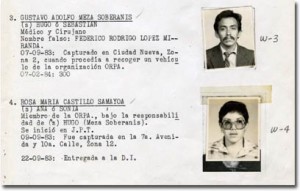From the Guatemalan Human Rights Commission:
“In Guatemala today, Efraín Ríos Montt and José Mauricio Rodríguez Sánchez are going to trial on charges of genocide and crimes against humanity for massacres committed against indigenous civilians in Guatemala’s Ixil triangle. This historic case is the first time that a former head of state is being tried for genocide in a domestic court. It is crucial for the nation’s healing process, and will be a key step in ending impunity for the atrocities committed during the war.”
The trial of these major military leaders is an important attempt by human rights defenders and victims to bring those still able to stand trial to justice. The crimes commited against those who lost life and loved ones to the Guatemalan state’s coordinated terror campaign form a seminal era in Cold War history. The targeted killing of indigenous peoples across Central America in the name of fighting communism on the US’s dime lays bare the implications of imperialism, indigeneity and land use in a stratified third world country of the 1980s.
Follow the trial monitoring blog organized by the Open Society Justice Initiative! To access video resources relating to Guatemala’s indigenous struggle, two important films are available in Babbidge library: When the Mountains Tremble, and Granito: How to Nail a Dictator. For a comprehensive archival collection, the Guatemalan Documentation Project coordinated by the National Security Archive contains key documents that will be utilized in the trial.



